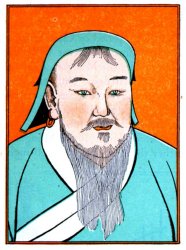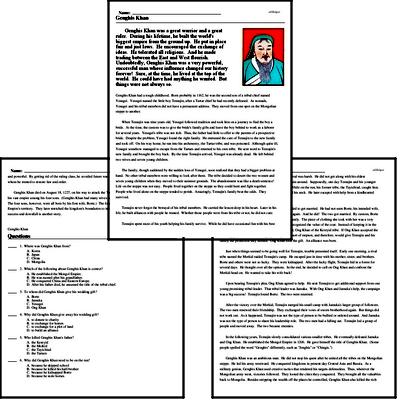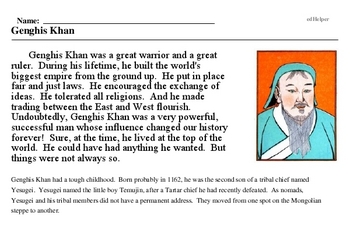Genghis Khan
Genghis Khan
Reading Comprehension for August 17
Genghis Khan was a great warrior and a great ruler. During his lifetime, he built the world's biggest empire from the ground up. He put in place fair and just laws. He encouraged the exchange of ideas. He tolerated all religions. And he made trading between the East and West flourish. Undoubtedly, Genghis Khan was a very powerful, successful man whose influence changed our history forever! Sure, at the time, he lived at the top of the world. He could have had anything he wanted. But things were not always so.
Genghis Khan had a tough childhood. Born probably in 1162, he was the second son of a tribal chief named Yesugei. Yesugei named the little boy Temujin, after a Tartar chief he had recently defeated. As nomads, Yesugei and his tribal members did not have a permanent address. They moved from one spot on the Mongolian steppe to another.
When Temujin was nine years old, Yesugei followed tradition and took him on a journey to find the boy a bride. At the time, the custom was to give the bride's family gifts and leave the boy behind to work as a laborer for several years. Yesugei's tribe was not rich. Thus, the father had little to offer to the parents of a prospective bride. Despite the problem, Yesugei found the right family. He entrusted the care of Temujin to the new family and took off. On his way home, he ran into his archenemy, the Tartar tribe, and was poisoned. Although quite ill, Yesugei somehow managed to escape from the Tartars and returned to his own tribe. He sent word to Temujin's new family and brought the boy back. By the time Temujin arrived, Yesugei was already dead. He left behind two wives and seven young children.
The family, though saddened by the sudden loss of Yesugei, soon realized that they had a bigger problem at hand. No other tribal members were willing to look after them. The tribe decided to desert the two women and seven young children when they moved to their summer grounds. The abandonment was like a death sentence! Life on the steppe was not easy. People lived together on the steppe so they could hunt and fight together. People who lived alone on the steppe tended to perish. Amazingly, Temujin's family beat the odds. They survived.




